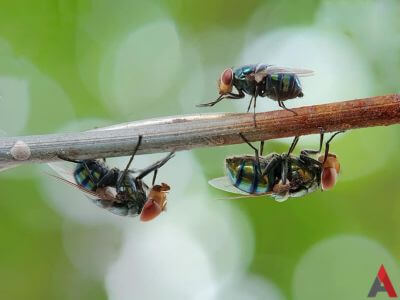
Horse Flies in North Carolina
Horse flies are one of the most troublesome biting bugs in North Carolina, especially in areas near water, farmland, or wooded spaces. Known for their painful bites and relentless behavior, these pests can ruin your day just by buzzing around. Learning about horse flies, what attracts them, and how to eliminate them is essential to maintaining a clean and pest-free home.

What are Horse Flies
Horse flies, part of the Tabanidae family, are large, fast-flying insects known for their painful bites. Unlike other flies that feed on decaying organic material, female horse flies rely on blood meals to reproduce.
Key features of horse flies include:
- Size: Larger than most flies, with some species reaching over an inch in length.
- Appearance: They have robust bodies, large compound eyes, and strong wings.
- Behavior: Females bite to obtain blood, while males feed on nectar and plant juices.
Where Do Horse Flies Come From
Horse flies are commonly found in environments that provide ideal conditions for their lifecycle, particularly areas with moisture, shade, and access to food sources.
Wetlands and Marshes
Wetlands and marshes are prime breeding grounds for horse flies due to their high moisture levels. Female horse flies lay their eggs on vegetation near water sources, such as ponds, streams, or marshy areas. The larvae develop in the wet soil or organic material, feeding on decaying matter before maturing into adult flies.
These environments are particularly favorable because they offer a consistent water source and shelter for larvae to thrive.
Shaded Areas
Horse flies are often found in shaded regions, such as wooded areas or locations with tall grass. These spots provide a cool, protected environment where horse flies can rest during hot parts of the day.
Shaded areas also serve as hiding spots for adult horse flies to avoid predators and wait for opportunities to feed on passing animals or humans.
Livestock Environments
Horse flies, like stable flies, are strongly attracted to livestock habitats, where manure, animal waste, and the presence of warm-blooded animals provide ample food sources. These pests are notorious for feeding on the blood of cattle, horses, and other animals, causing irritation and stress to the livestock.
Where You Might Find Horse Flies in Your Home
While horse flies prefer outdoor environments, they can occasionally enter homes. Common places you might find them include:
Windows and Doors
One of the most common places to spot horse flies in your home is near windows and doors. These pests are attracted to light and will often congregate around windows as they attempt to escape back outdoors.
If doors or windows are left open or have damaged screens, horse flies can easily enter your home, especially during peak activity periods in warmer months. Sealing entry points can significantly reduce horse flies' chances of entering.
Garages and Sheds
Garages and sheds provide a cool, shaded environment that can appeal to horse flies seeking shelter. These spaces often have gaps or openings that make it easy for flies to enter, especially in rural or suburban areas near water sources or livestock. Cluttered or infrequently cleaned areas may also offer hiding spots for horse flies, allowing them to remain undetected for some time.
Near Pets or Livestock
Garages and sheds provide a cool, shaded environment that can appeal to horse flies seeking shelter. These spaces often have gaps or openings that make it easy for flies to enter, especially in rural or suburban areas near water sources or livestock. Cluttered or infrequently cleaned areas may also offer hiding spots for horse flies, allowing them to remain undetected for some time.
How to Get Rid of Horse Flies
Controlling horse flies involves both preventative measures and targeted treatments to reduce their numbers and minimize their impact.
Remove Breeding Areas
Horse flies thrive in areas with standing water and organic waste, which provide ideal breeding grounds for their larvae. To reduce their population, eliminate standing water by improving drainage around your property and regularly emptying containers like buckets, birdbaths, and troughs.
Clean up areas with animal waste or manure, especially if you have livestock, as these materials attract horse flies for feeding and egg-laying. Maintaining a clean environment disrupts their lifecycle and reduces their numbers over time.
Install Screens
Sealing your home with fine mesh screens is an effective way to keep horse flies from entering indoor spaces. Ensure all windows and doors are fitted with tight, tear-free screens to prevent flies from sneaking in. Pay attention to any gaps or holes in existing screens and repair them promptly.
For additional protection, consider using self-closing screen doors and sealing other potential entry points around your property.
Use Fly Traps
Fly traps, whether commercial or homemade, are an effective method for capturing and reducing horse fly populations. Commercial traps use bait to lure the flies, while homemade traps can be made using materials like sticky paper or jars baited with sugar water.
Place traps in areas where horse flies are most active, such as near barns, trash bins, or water sources. Regularly monitor and empty the traps to maintain their effectiveness.
Wear Protective Clothing
When spending time outdoors in areas prone to horse flies, wearing protective clothing can significantly reduce your chances of being bitten. Long sleeves, pants, and hats create a physical barrier between your skin and the flies.
Opt for light-colored clothing, as dark colors can attract horse flies. Insect repellents approved for use on humans can also provide an added layer of protection.
Contact Professionals
For severe or persistent horse fly infestations, professional pest control services offer comprehensive solutions. Pest control experts can assess your property to identify breeding sites, provide targeted treatments, and recommend long-term strategies to prevent future infestations.
Frequently Asked Questions
Why do I suddenly have horse flies?
Horse flies are more prevalent during warm, humid weather and are attracted to areas with standing water, animals, or shaded vegetation. A sudden appearance could indicate nearby breeding grounds or environmental conditions favorable for their activity.
How do you get horse flies to go away?
Use fly traps to capture adult horse flies, placing them near areas where the pests are most active, such as barns or trash bins. Reducing attractants like standing water and animal waste is also crucial, as these serve as breeding grounds and feeding sites for horse flies. Additionally, wearing insect repellents containing DEET or other effective ingredients provides personal protection, helping to minimize bites during outdoor activities.
Why are horse flies so bad this year?
An increase in horse flies can be due to factors such as:
-
- Warmer and wetter weather conditions that create ideal breeding environments.
-
- Proximity to water sources, livestock, or dense vegetation.
-
- Seasonal population surges, especially during late spring and summer.
For similar reasons, you may also notice an increase in blowflies, house flies, and fruit flies.

